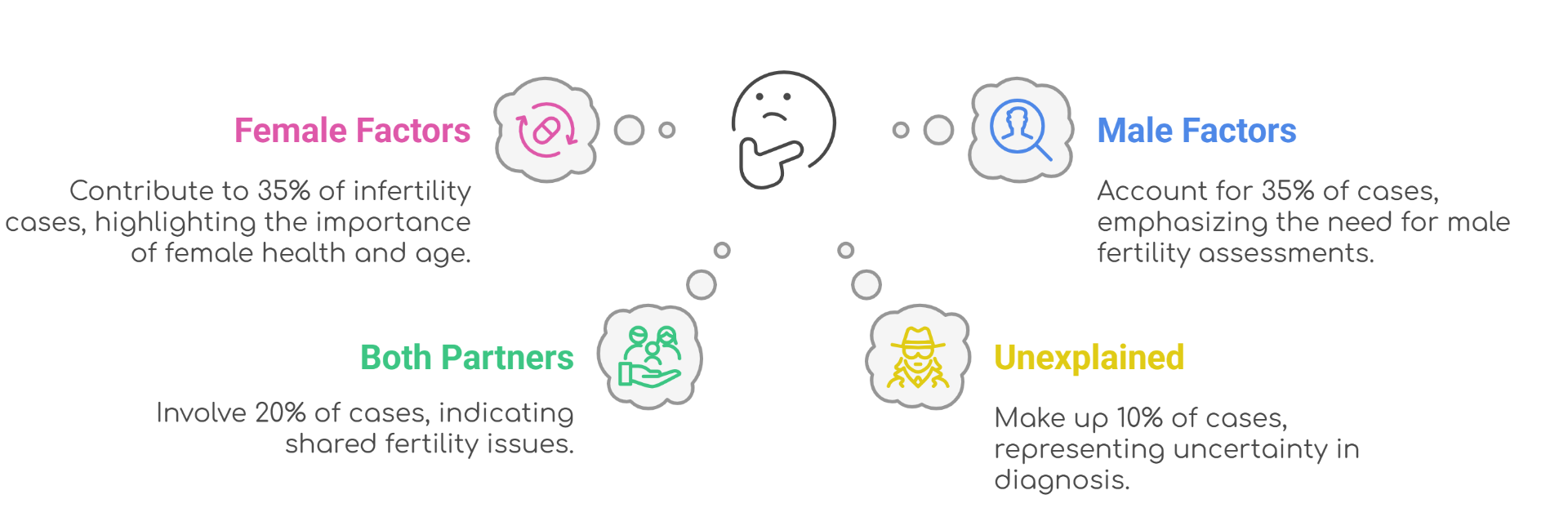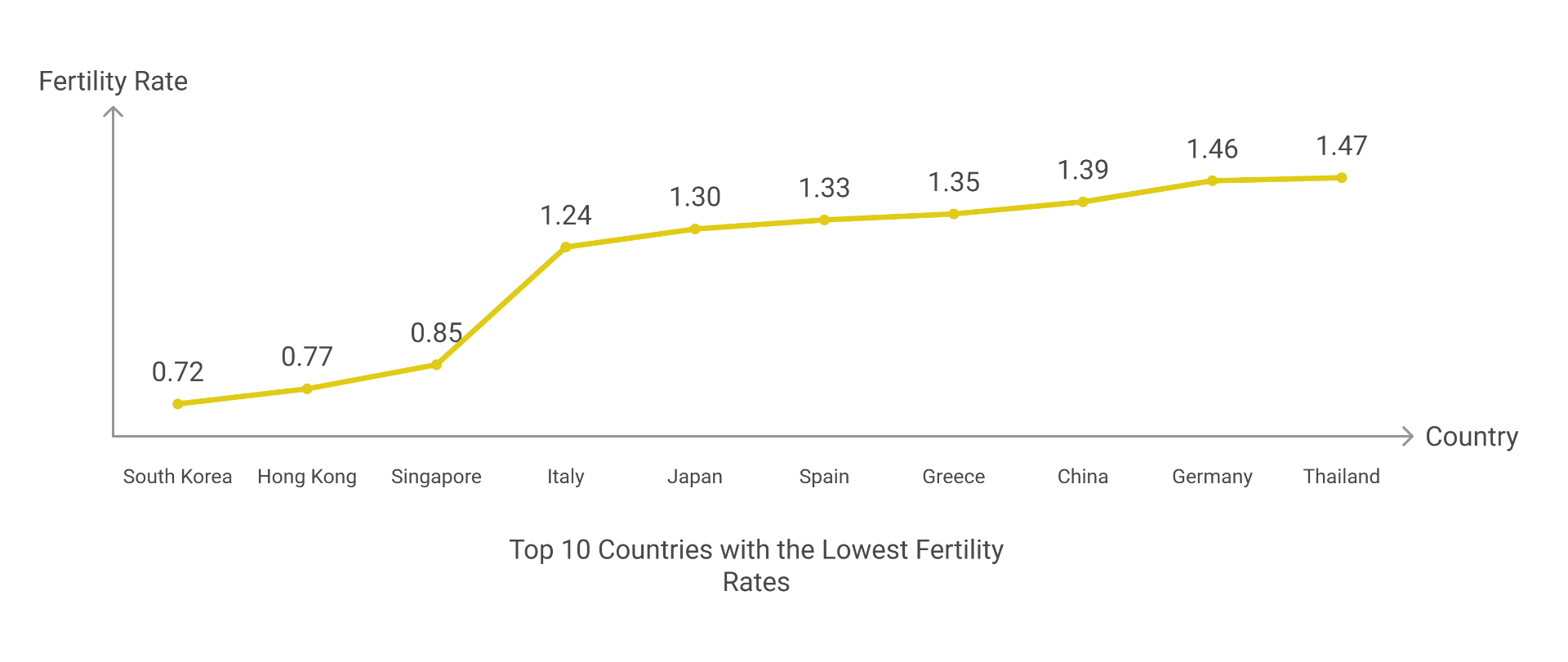Causes of Fertility and Infertility: Global Trends and IVF Insights
by:Fertility Cure Centre
|
onApril 16, 2025
In:World
|
TypeArticle

Introduction
Why do some couples conceive naturally while others struggle for years—even with medical help? Why are birth rates declining globally, and why is infertility rising at the same time? To understand this, we need to find the real causes of fertility and infertility—not just at the individual level but globally. Fertility is influenced by age, lifestyle, hormones, emotional health, environment, and access to care. Across the world, fertility rates are dropping due to late parenthood, career pressure, and health complications—while infertility cases are steadily rising. This article will explain to you what causes fertility issues in both men and women, the reason why IVF sometimes fails even after doing everything right, and how global fertility trends are shifting. You’ll also learn practical steps to protect your fertility, backed by expert insights and the care-based experience of Fertility Cure Centre, a trusted name in assisted reproductive care.
What Is Fertility, and Why Is It Changing Worldwide?
Fertility refers to the natural conception and carrying of a pregnancy. For women, it typically peaks in their 20s and declines steadily after 30. For men, fertility lasts longer but isn’t immune to age-related decline or environmental factors. Globally, the fertility rate—the average number of children born per woman—dropped from 5 in the 1960s to 2.3 in 2023. Meanwhile, infertility rates are rising. The World Health Organization estimates that one in six people globally will experience infertility at some point in their lives.
Source: World Bank – Global Fertility Rate 2023
What Causes Fertility Issues in Women?
Fertility issues are now multiplying, and it is difficult to get pregnant naturally. Healthy ovulation, reproductive organs, hormonal balance, and general health are all necessary. If any of those problems are present in the couple, natural pregnancy will be difficult. However, several medical and lifestyle factors can interfere with this delicate process.
1. Ovulation Disorders
One of the most common causes of infertility in women is the inability to ovulate regularly. Conditions like PCOS (Polycystic Ovary Syndrome) or thyroid imbalances can cause irregular or absent periods, making conception harder. Many women don’t realize these hormonal disruptions until they begin trying to conceive.
Read more: [How PCOS Affects Fertility] (Coming Soon)
2. Blocked Fallopian Tubes
When you are attempting to conceive, it is common for you to be unaware of the fact that your fallopian tubes are blocked, which creates a physical barrier to pregnancy. This may be the result of an infection, previous surgical procedures, or endometriosis, which causes the egg and sperm to be unable to meet, resulting in problems conceiving a child.
3. Endometriosis
This condition occurs when tissue similar to the lining of the uterus grows outside of it. It can cause pain, swelling, and even scarring.
Endometriosis can make it hard for eggs to release, tubes to work correctly, or implants to stick. These are all essential steps in getting pregnant.
4. Lifestyle and Age
What causes fertility problems in women also includes modern lifestyle habits. There is a natural drop in fertility with age, particularly after age 35. At the same time, poor diet, lack of exercise, smoking, alcohol, and stress can silently reduce a woman’s chances of conceiving.
What Causes Fertility Problems in Men?
Contrary to popular belief, infertility is just as likely to stem from the male partner. Roughly 40–50% of fertility issues are male-related. Yet, fertility problems in men are often left undiscussed until much later in the journey.
1. Low Sperm Count or Poor Sperm Quality
The most common causes of fertility problems in men relate to the quantity and quality of sperm. A low sperm count, poor motility (movement), or abnormal shape makes it difficult for sperm to reach and fertilize the egg. Stress, alcohol use, smoking, exposure to high temperatures (like laptops or saunas), and even tight clothing can quietly affect sperm health over time.
2. Sexual or Hormonal Health Problem
Conditions like erectile dysfunction, premature ejaculation, and low testosterone levels may complicate infertility. However, even if such problems may be caused by conditions such as diabetes, being overweight, or mental stress, they too frequently get overlooked or ridiculed.
At Fertility Cure Centre, we encourage open, judgment-free evaluations for male partners because fertility is always a shared journey.
These are the Common Causes of Infertility in Couples
When couples try to conceive without success, looking at both partners is essential. Global data shows.
- 35% of infertility cases are due to female factors.
- 35% are male-related.
- 20% involve both partners.
- And 10% remain unexplained infertility.

Unexplained infertility is incredibly frustrating. Even though the results of the tests were expected, the pregnancy did not occur. Most of the time, it results from subtle hormone imbalances, problems with embryo development, or pressures related to lifestyle choices. In most cases, couples who fall into this category can benefit from fertility tracking, intrauterine insemination, or in vitro fertilization (IVF) that is tailored to their specific circumstances.
Read More: [What Is Unexplained Infertility and How to Treat It] (Coming Soon)
Why IVF Fails Even With Advanced Technology
IVF (In Vitro Fertilization) has brought millions of babies into the world. But it's not always successful. Even the best doctors and labs face causes of IVF failure that aren't always in their control.
Sometimes, the quality of eggs or sperm is too low to produce a healthy embryo, or embryos fail to implant in the uterus because the lining is too thin or inflamed. As women age, even good embryos carry higher genetic risks that can lead to miscarriage.
And then there's the emotional side. Stress during IVF can affect hormones, blood flow, and sleep, all of which impact success. At Fertility Cure Centre, we treat IVF not just as a medical procedure but as a journey that needs emotional care, lifestyle support, and clear communication at every step.
Top 10 Countries with the Lowest Fertility Rates
| Rank |
Country |
Fertility Rate |
| 1 | South Korea |
0.72 |
| 2 | Hong Kong |
0.77 |
| 3 | Singapore |
0.85 |
| 4 | Italy |
1.24 |
| 5 | Japan |
1.30 |
| 6 | Spain |
1.33 |
| 7 | Greece |
1.35 |
| 8 | China |
1.39 |
| 9 | Germany |
1.46 |
| 10 | Thailand |
1.47 |
| Source: World Bank – Fertility Data - 2023 |
||

Why Fertility Is Declining Around the World
1. People are marrying and having children later.
As individuals focus on careers and education, family planning is delayed. The natural decline in fertility with age then leads to difficulty conceiving, even when health appears normal.
2. Career and financial pressure is rising.
Many people put off or altogether forgo becoming parents because of the financial burden of raising children or the lack of clarity regarding their financial situation. These delays are a silent contributor to reproductive problems that persist over the long run.
3. Urban lifestyles lack emotional and family support.
Nuclear households, long work hours, and reduced family bonding leave couples isolated during crucial reproductive years.
4. Obesity and poor diet affect hormones.
Unhealthy food habits and sedentary living directly affect ovulation and sperm production, increasing the most common causes of infertility.
5. The toxins in our environment are increasing.
Air pollution, chemicals in plastic, and hormone-disrupting compounds silently affect reproductive health worldwide.
6. Chronic stress and mental health issues interfere with fertility.
Emotional burnout, anxiety, and overwork disturb hormone balance, creating an invisible wall for couples trying to conceive.
Why India's Fertility Rate is Declining, Still Has a High Fertility Rate.
The cause of the high fertility rate in India has roots in tradition, limited education, and early marriages. However, the gap between urban and rural fertility is widening fast.
Why the Fertility rate in urban cities is declining.
- Career-focused couples delay childbearing well into their 30s.
- Single-child preferences are rising due to lifestyle choices.
- Easy IVF access encourages delays by creating a false sense of security.
Why the Fertility Rate in Rural Areas is Still High.
- Early marriage increases the chances of early pregnancy.
- The lack of knowledge of contraception and lack of educational awareness lead to unplanned pregnancies.
- Cultural preference for large families still influences reproductive behaviour.
Protecting Your Fertility Health.
If you're planning a pregnancy now or later, here are a few truths worth remembering:
- Your body gives a signal before it struggles. Listen early.
- Regular cycles don't always mean fertility is intact.
- Testing matters. Health is holistic—stress, food, sleep, and movement all count.
- Fertility is shared—both partners should feel equally supported and seen.
- Science is here to help, but timing still matters.
Final Thoughts
Understanding the causes of fertility and infertility is about giving yourself space to hope—with clarity. You don’t need all the answers simultaneously, just the courage to ask. Whether you face hormone imbalance, lifestyle challenges, unexplained delays, or age-related limits, help exists.
At Fertility Cure Centre, we combine expert science with deep empathy to walk with you—no matter where you are in your journey.
Helpful Resources
- Contact Us: Book Your IVF Consultation with Fertility Cure Centre – Gurgaon
- Related Post: Cost of IVF Treatment in Gurgaon: A Detailed Guide
- Learn More: Who Needs IVF? Common Indications
- Resolve: Fertility Support Resources – Resolve.org
- WHO: Global Fertility Trends – WHO


